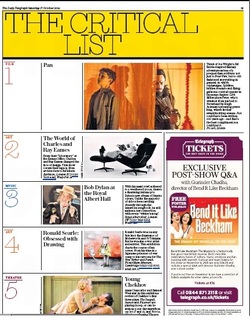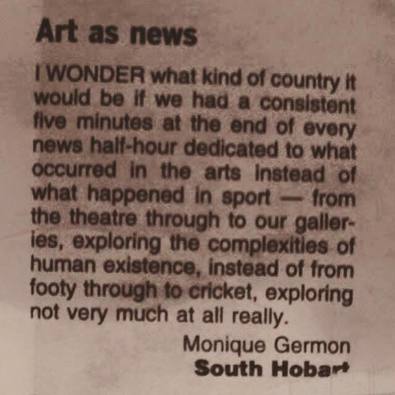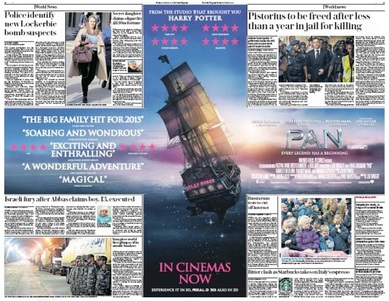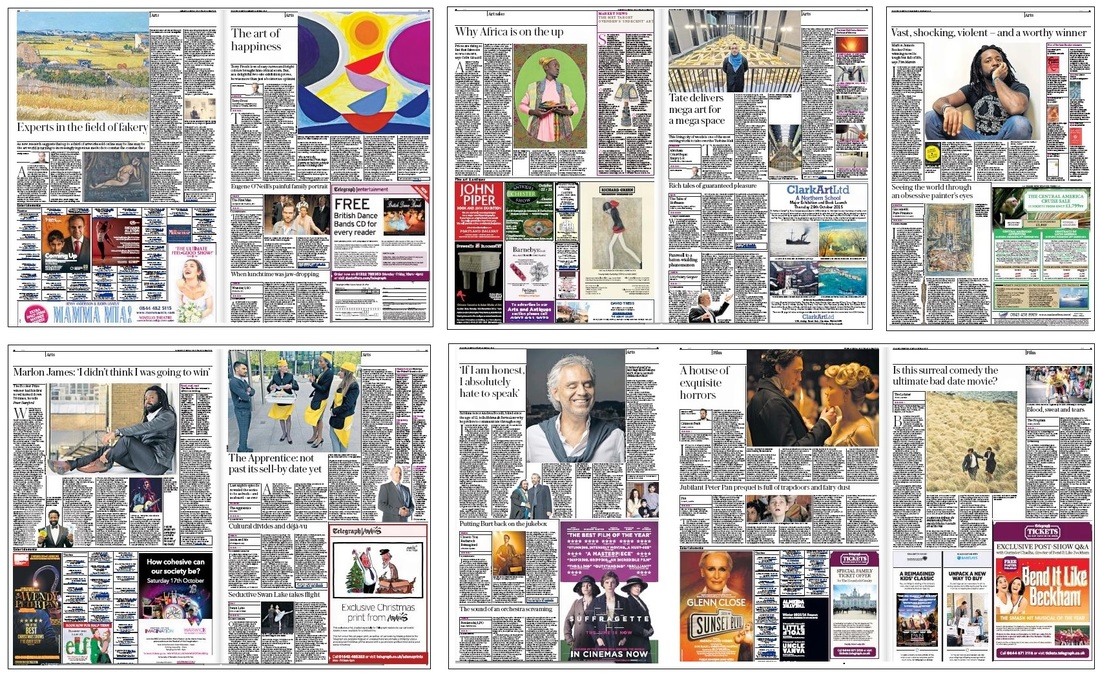It was, of course, a spurious contest. It would be bonkers to forsake sport for the arts or any other specialist subject. But why should it be either/or? And why are most of our national newspapers so ambivalent about the arts?
I sat down on Saturday to read the Telegraph's 64-page "Review" section. I use inverted commas because reviewing did not seem to be a major part of the supplement's remit.
At the front end were a series of interviews - all interesting in their own way - with various artists, mostly with projects to promote. At the back was the obligatory TV guide. Nothing wrong with that either.

Each had a picture, a heading and a paragraph of text. It looks like an index page, hinting at more to come on the following pages. Not a bit of it. That's your lot. An absolute triumph of style over substance (with apologies to design director Jon Hill).
Over the page was a double page spread dominated by a Canaletto and two big ads. This was the critics' "what's on" guide to film, theatre, exhibitions and concerts. These included three films, three plays and three exhibitions, which were allowed 75 words apiece - including the vital where and when details plus plot outlines for those unfamiliar with French Without Tears and Lord of the Flies.
Next up was the music page. One pop and one classical CD review - which were at least given 400 words apiece.
If reading is your thing, you're better served. Past the West End ads, there was a spread on Charlotte Bronte and then reviews of seven books - including Michael Ashcroft's Call Me Dave, in case the Piggate story passed you by. Interestingly, each review was accompanied by a little panel telling you how you could buy the book from the Telegraph. There was also a tie-up with WH Smith for the "pick of the week" title and further ads offering the chance to buy an Andrew Marr poetry anthology and Tom Holland's Dynasty - again from the Telegraph.
What I am suggesting is that the coverage was - and generally is - inadequate.
It wouldn't be so bad if there were proper treatment of the arts during the week, but there isn't. The block of pictures below shows all the Telegraph's weekday arts pages from last week.
In common with the Baftas, the Brits, the Turner Prize and the Mercury Prize, the award for the novel of the year generally manages to leap the fence separating news and features. But this year it warranted only a nib on page 2 of the Telegraph.
Even that was better than the Mercury managed. The 12 nominations for album of the year were announced on Friday morning. Last year, the Telegraph ran a story by critic Neil McCormick and a rundown of the nominees, complete with audio links, on its website. This year? Nothing. Not a word in the paper or online.
Ditto The Times. The Guardian gave the list a full page, the Independent half a page. The Mail didn't manage anything in the paper, but ran a piece about Florence + The Machine online, linked in with "how to buy a shirt like the one she wore at Glastonbury" ad. The Sun was disparaging, saying that the award had become irrelevant and that the judges were on another planet (ho ho), but at least it ran the list.
Neither The Times nor the Telegraph is known for its love of the BBC, which is running the prize this year, but surely you would have to be an arch cynic to believe the lack of coverage is down to spite.
In his Telegraph commentary bemoaning Ed Sheeran's absence from the nominees last year, McCormick pre-empted Dan Wootton of the Sun in declaring the prize irrelevant, so maybe the paper has taken its critic at his word.
And maybe he had a point: Sheeran's album x sold 1.7m copies last year But critics above all others must realise that commercial success is not necessarily a measure of artistic merit - should 50 Shades of Grey have featured on the Booker list of 2012?
Whether you approve of the nominees or not, this cavalier attitude to even the big set-piece events of the arts calendar is extraordinary. Yet it is the inevitable result of not caring about the arts week in, week out. Can you imagine a paper choosing to cover only two football matches in a week - one soccer (sorry), one rugby - as the Telegraph did one classical and one pop CD?
Look again at those ten weekday arts pages, heavily laden with supporting ads. How do they compare with sport? Well, over the same five days, the Telegraph ran 108 sports pages. And as for generating revenue? Last Friday's 24-page supplement had five paid ads.
As I said at the beginning, it's not a case of either/or. Sport is important. But so are the arts. They lift the spirit, they teach us about life, they simply entertain. And for those who believe only in the bottom line, here's a statistical portrait of the UK's cultural landscape last year:
- 67 million tickets were sold to professional sporting fixtures, of which
- 42.8 million were to football matches
- 311 million books were sold
- 157.5 million cinema tickets were sold
- 14.7 million tickets were sold for London theatre performances
- 14.8 billion - yes billion - songs were streamed over the internet
- 1.3 million vinyl records were sold
- 55.7 million CDs were sold - which, combined with vinyl, accounted for half of album (or album equivalent) sales
- 17.4 million tickets were sold for music concerts
- 3.5 million tickets were sold for music festivals
- 49 million people visited Britain's 16 national museums and galleries (not necessarily 49 million different people, any more than the 42 million football fans were all different people)
- 77% of the population either attended or took part in at least one artistic performance.
There are an awful lot of people out there who care about sport. And even more who care about the arts. Editors, please take note.





 RSS Feed
RSS Feed


